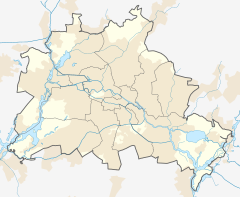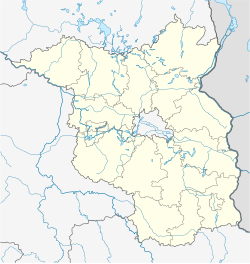 2007 | ||||||||||||||
| General information | ||||||||||||||
| Location | Seegefelder Weg 464 13591 Berlin Spandau Germany | |||||||||||||
| Coordinates | 52°32′58″N13°07′42″E / 52.54944°N 13.12833°E | |||||||||||||
| Owned by | DB Netz | |||||||||||||
| Operated by | DB Station&Service | |||||||||||||
| Line(s) | ||||||||||||||
| Platforms | 2 side platforms | |||||||||||||
| Tracks | 2 | |||||||||||||
| Train operators | DB Regio Nordost | |||||||||||||
| Connections | | |||||||||||||
| Other information | ||||||||||||||
| Station code | 45 | |||||||||||||
| DS100 code | BAS [1] | |||||||||||||
| IBNR | 8080040 | |||||||||||||
| Category | 5 [2] | |||||||||||||
| Fare zone | | |||||||||||||
| Website | www.bahnhof.de | |||||||||||||
| History | ||||||||||||||
| Opened | 1 April 1943 | |||||||||||||
| Closed | | |||||||||||||
| Electrified | main line 28 September 1983, 15 kV 16 2⁄3 Hz AC system (overhead) | |||||||||||||
| Key dates | ||||||||||||||
| 1945, 24 April - early August | operation interrupted | |||||||||||||
| 23 May 1993 - 28 May 1995 | operation interrupted | |||||||||||||
| Services | ||||||||||||||
| ||||||||||||||
 | ||||||||||||||
| ||||||||||||||
Berlin-Albrechtshof is a railway station located in Staaken, a locality in the Spandau district of Berlin. It is one of only two Deutsche Bahn stations in Berlin not served by the S-Bahn; Staaken station is the other.



